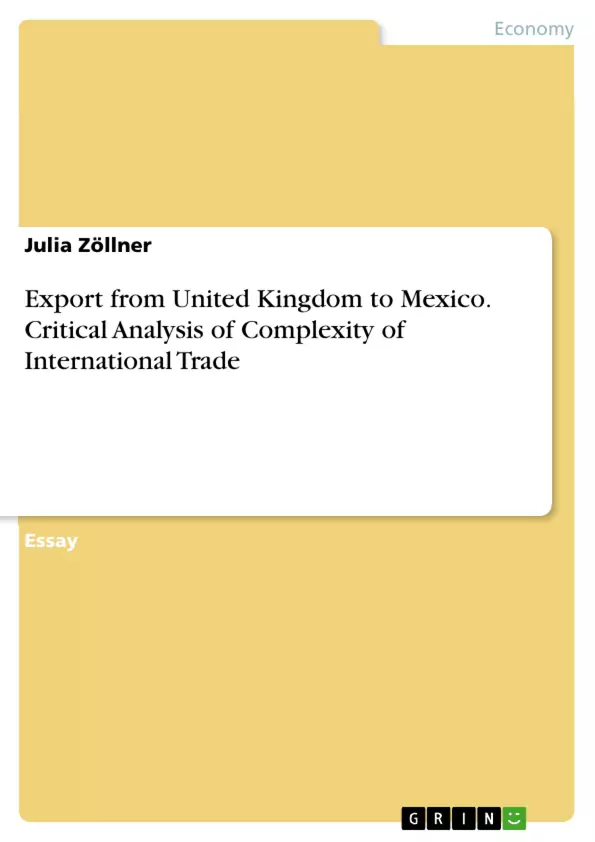The first document to begin with is the Purchase Order to trigger the delivery between the Mexican importer and British exporter confirming price, quality and quantity of products being ordered. After signed by the importer the Purchase Order acts as a binding acceptance for both sides (globalnegotiator, nd).
After that, the importer receives the Commercial Invoice defining “the process used by customs officials to classify merchandise so that duties and taxes can be correctly assessed”. It declares total sum for products that has to be paid including tax and it states the agreed Incoterms which will be explained in the following chapter. Additionally the Commercial Invoice acts as a documentation of sales for the exporter.
The Incoterms are at least declared within the Commercial Invoice albeit negotiated before between the British exporter and the Mexican importer. The Incoterms, as shown in figure xxx, define two vital aspects: who is responsible to organise as well as pay the transport and who is responsible to carry the risk. The choice of Incoterms depends on a variety of factors.
Inhaltsverzeichnis (Table of Contents)
- Export from United Kingdom to Mexico
- Purchase Documents
- International Sales Contracts
- Bill of Lading
- Air and Sea Waybills
- Bills of Exchange
- Letter of Credit
- Insurance Documents
- Free Trade Agreement EUR.1
- Complexity of International Trade
- References
Zielsetzung und Themenschwerpunkte (Objectives and Key Themes)
This document aims to provide a comprehensive overview of the process of exporting goods from the United Kingdom to Mexico, focusing on the various documents and legal frameworks involved. The text examines the practical aspects of international trade, highlighting the importance of legal compliance and the negotiation of contractual terms.
- International trade documents
- Incoterms and their implications
- International sales contracts
- Bill of Lading and related legal frameworks
- Risk and responsibility in international trade
Zusammenfassung der Kapitel (Chapter Summaries)
- Export from United Kingdom to Mexico: This chapter introduces the initial steps in the export process, focusing on the purchase order and the commercial invoice. It highlights the significance of these documents in establishing a binding agreement and ensuring accurate classification of goods for customs purposes.
- International Sales Contracts: This section delves into the intricacies of Incoterms, emphasizing their role in defining responsibilities for transportation and risk management. The chapter discusses the factors influencing the choice of Incoterms, such as market presence, pricing strategies, and shipment characteristics.
- Bill of Lading: This chapter examines the Bill of Lading (BoL) as a vital document in the transportation process. It outlines the different terms and conditions that may be included within the BoL and explores the legal frameworks, such as the Hague Rules and Hague-Visby Rules, governing the rights and obligations of both the exporter and the freight provider.
Schlüsselwörter (Keywords)
The primary focus of this text revolves around international business environment and trade, encompassing essential concepts like purchase orders, commercial invoices, Incoterms, international sales contracts, Bill of Lading, and various legal frameworks such as the Hague Rules and Hague-Visby Rules. It explores the complexities of risk management and the role of insurance documents within the global trade landscape.
Frequently Asked Questions
What is the purpose of a Purchase Order in international trade?
It triggers the delivery process and acts as a binding contract confirming price, quality, and quantity between the importer and exporter.
What are Incoterms?
Incoterms define who is responsible for organizing and paying for transport and who carries the risk during the shipping process.
What is a Bill of Lading?
It is a vital document issued by a carrier to acknowledge receipt of cargo for shipment, serving as a document of title and a contract of carriage.
Why is the Commercial Invoice important for customs?
Customs officials use it to classify merchandise so that duties and taxes can be correctly assessed.
What legal frameworks govern international shipping?
Frameworks like the Hague Rules and Hague-Visby Rules define the rights and obligations of exporters and freight providers.
- Arbeit zitieren
- Julia Zöllner (Autor:in), 2015, Export from United Kingdom to Mexico. Critical Analysis of Complexity of International Trade, München, GRIN Verlag, https://www.grin.com/document/301007



